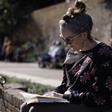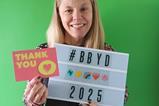After hearing about the growth of ’Death Cafés’ , Alex Noel has come to the conclusion that maybe facing death can make life worth living.

In 2016, not long after my grandmother died, I spotted a small handwritten advert for a ‘Death Café’ pinned to a noticeboard in a London coffee shop. ‘What on earth is that?’ I wondered. The note explained that this was a small monthly gathering where people could meet up and talk about death - over tea and cake. I was intrigued. But I was also sceptical. Could discussing death with strangers really help someone to come to terms with it, or to deal with their grief?
Fast forward to 2024 and Death Cafés are becoming something of a trend.
Fast forward to 2024 and Death Cafés are becoming something of a trend. Emma Freud wrote recently for The Times about her experience of visiting one in her new corner of London. She reflected; “I learnt more about the soul of my neighbourhood in those two hours than I had in the previous two months”.
She described how connecting with a group of strangers, where there was licence to show vulnerability (without judgement) felt tender to her, and surprisingly joyful too.
The first referenced Death Café took place in a Hackney living room in 2011, inspired by the ‘Cafés Mortels’ founded by Swiss sociologist, Bernard Crettaz. Since then they have quietly found their way around the world (and online - during Covid-19). There are now over 18,000 globally with more in countries where culture usually denotes keeping tight-lipped on the subject; “hence we have 3,400 in the UK”, say Emma Freud.
It’s all part of the growing ‘Death Positive Movement’, which has emerged in recent years.
It’s all part of the growing ‘Death Positive Movement’, which has emerged in recent years. The intention is to encourage a calm acceptance of our fate, and to normalise talking about death. Fostering a more positive approach to death led LA funeral director Caitlin Doughty to establish ‘The Order of the Good Death’, also in 2011. She explains on the website that it’s about “making death a part of your life…staring down your death fears - [and] accepting that death itself is natural, but the death anxiety and terror of modern culture are not.” It’s important that we come to terms with an inevitability we will all face at some point. Doing so can even make living life feel more worthwhile.
One person who has epitomised this is Kris Hallenga, founder and CEO of breast cancer awareness charity, CoppaFeel! After being diagnosed with stage 4 breast cancer at the age of 23, she spent the next 15 years stoically facing the reality of death. She described how her diagnosis actually focused her. She quickly became a passionate advocate and campaigner for the early detection of breast cancer, especially among the under-30s, so that those in a similar position could survive. Kris died on 6 May 2024, aged 38. But not before she’d reckoned with her impending death; living a full life which included a remarkable celebration.
In June 2023 she threw herself a living funeral; “I call it a FUNeral”, she said in an article for The Telegraph shortly afterwards. The dress code was YODO (You Only Die Once) which was entirely open to interpretation. Considering the circumstances she was clear that “all emotions” were allowed. Kris invited 160 family and friends - among them were actors Dawn French (successfully persuaded to come dressed as the Vicar of Dibley), Giovanna Fletcher and presenter Fearne Cotton who described the event as an “euphoric celebration of life”.
Read more on death
What I learned from my vicar Dad about the practical side of preparing for death
Are we too afraid of death? Here’s what Christians should remember
Despite our Christian faith being largely defined by the death and resurrection of Jesus, in the Church we’re surprisingly uncomfortable with it. Speaking with several women over the last few months, who have experienced grief and death in some way (from infertility or baby loss, to the death of a family member, to acknowledging the fears of old age and dying), a common theme has emerged. It can be a particularly lonely experience to go through these things in the Church - they are rarely acknowledged ‘from the pulpit’, or talked about openly within our communities.
But we can become one of the first places people go to face these realities. As charity Ataloss shows, by training churches in bereavement support, we can address this deficit, become more comfortable with the subject, and offer genuine hope, comfort and support. So that through facing death, people can then find - and celebrate - life in all its fulness.



































No comments yet